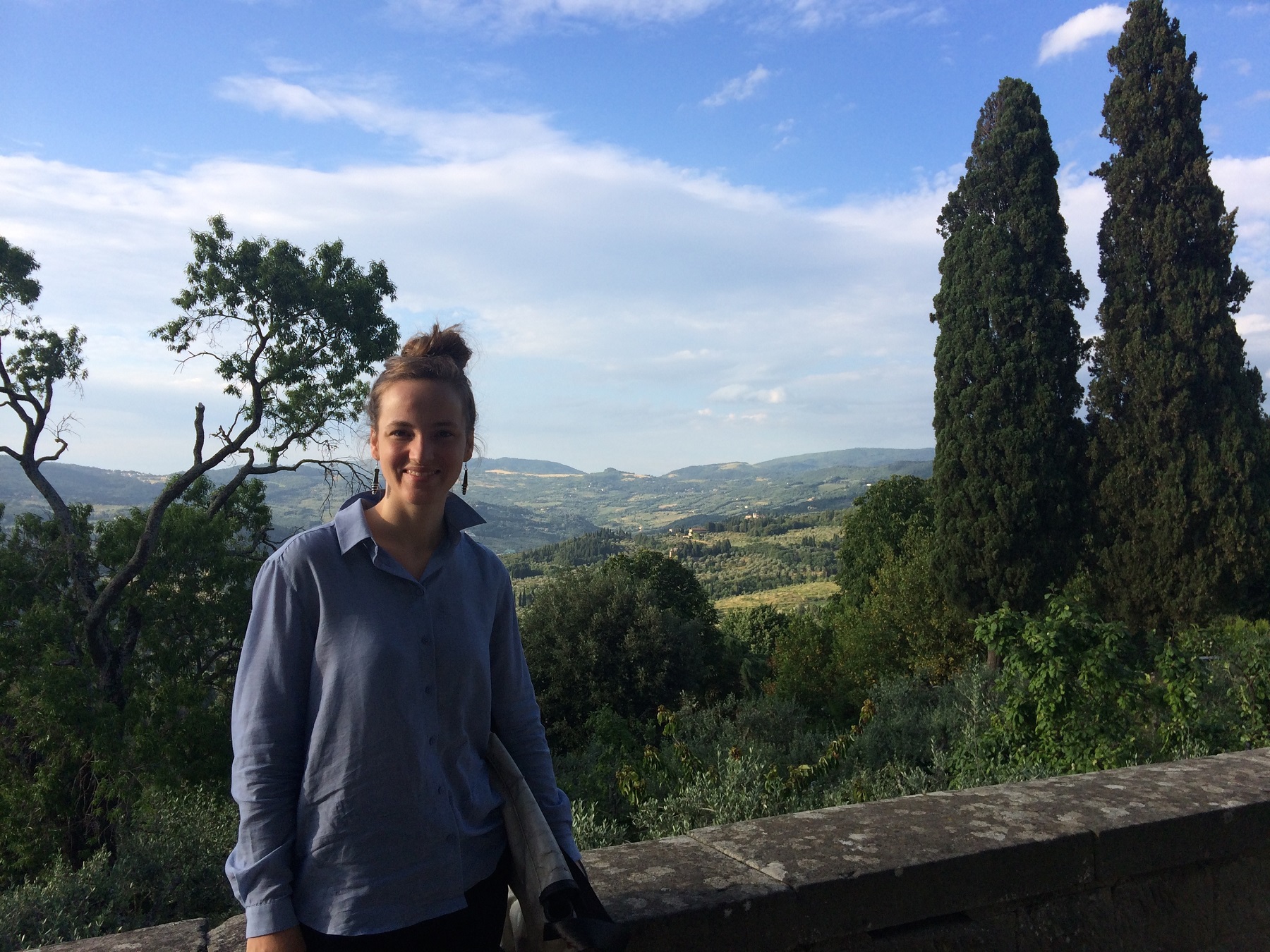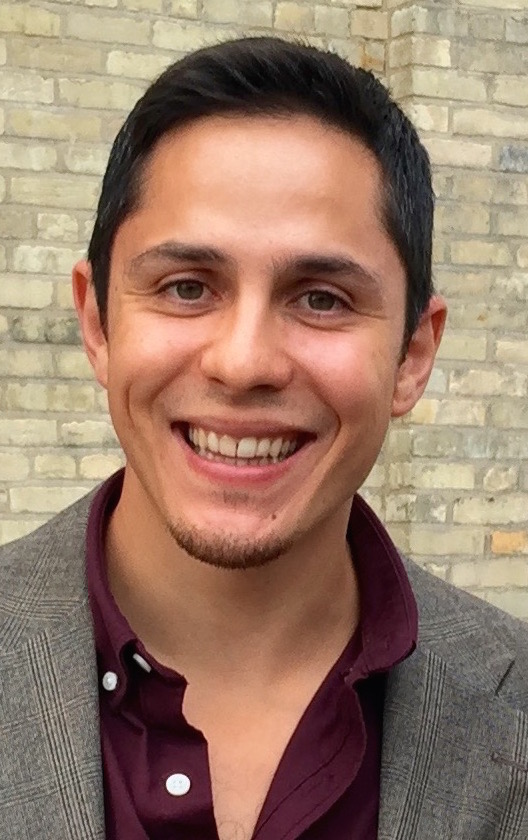Graduate Fellows
2017-18 IRCPL Graduate Fellows
The IRCPL Graduate Fellowship is awarded each Spring to assist students with expenses directly related to research, including travel, lodging, and materials during the Fall or Summer semester. Upon returning from their travel, students will issue reports on the results of their research. Information on how to apply for an IRCPL Fellowship is available here.
 Allison DeWitt is a PhD candidate in the Department of Italian and the Institute for Comparative Literature and Society. Her dissertation analyzes the use of geography in Dante’s Divine Comedy, specifically focused on representations of the Islamic world. It will be accompanied by a digital map to be hosted on Columbia’s Digital Dante site, for which she is an assistant editor. Her interests also include representations of Muslim women in literature, the gendered dimensions of spatiality and visualizations of literary geography. She holds a B.A. from New York University in German and Italian Literatures and an M.A. and M.Phil in Italian from Columbia.
Allison DeWitt is a PhD candidate in the Department of Italian and the Institute for Comparative Literature and Society. Her dissertation analyzes the use of geography in Dante’s Divine Comedy, specifically focused on representations of the Islamic world. It will be accompanied by a digital map to be hosted on Columbia’s Digital Dante site, for which she is an assistant editor. Her interests also include representations of Muslim women in literature, the gendered dimensions of spatiality and visualizations of literary geography. She holds a B.A. from New York University in German and Italian Literatures and an M.A. and M.Phil in Italian from Columbia.
 Sarina Kuersteiner is a PhD student in medieval history at Columbia University’s Department of History. Her research focuses on the increasingly important role of notaries in the administration of public and private life in the medieval Mediterranean. Combining literary and legal sources, her research analyzes how ideas about spirituality, gender, family, social order, and the body itself worked together in the self-fashioning of medieval notaries to produce a system of thought and action in which men, through their reason, bodily awareness, and self control, acted as crucial servants of the common good. Sarina earned her BA from the University of Zurich (Switzerland) and her MA in German Literature and General History from Zurich, having spent her first year of the MA program at the University of California, Los Angeles (UCLA).
Sarina Kuersteiner is a PhD student in medieval history at Columbia University’s Department of History. Her research focuses on the increasingly important role of notaries in the administration of public and private life in the medieval Mediterranean. Combining literary and legal sources, her research analyzes how ideas about spirituality, gender, family, social order, and the body itself worked together in the self-fashioning of medieval notaries to produce a system of thought and action in which men, through their reason, bodily awareness, and self control, acted as crucial servants of the common good. Sarina earned her BA from the University of Zurich (Switzerland) and her MA in German Literature and General History from Zurich, having spent her first year of the MA program at the University of California, Los Angeles (UCLA).
 Ling-Wei Kung is a Ph.D. student in Chinese and Tibetan history. His research interests center on international legal practices and global economic exchanges between modern China and Inner Asia during the 18th-20th centuries. He is also more broadly interested in the roles of Inner Asian peoples, especially Tibetans, Mongolians, and Uyghurs, in the competitions between the Qing, British and Russian Empires. He is currently working on a research project entitled as “Between Religion and Power: Buddhists and Muslims in the Yadong Customs of Tibet, 1889-1914.” By paying attention to the roles of Tibetan Buddhists and South Asian Muslims on the borderlands between Tibet and India, this project shows that the diverse religious traditions in Tibet are important to rediscovering the globalization of modern China and the transnational networks in the Zomia region. In so doing, he primarily works with Manchu, Mongolian, and Tibetan documents, along with Chinese materials. Ling-Wei received a B.A. in History from National Taiwan University (2012), and his M.A. in Tibetan Studies from Columbia University (2015). Before coming to New York City, he stayed in Beijing, where he studied Chinese and Inner Asian history, as well as Manchu, Mongolian and Tibetan at Renmin and Peking Universities for two years.
Ling-Wei Kung is a Ph.D. student in Chinese and Tibetan history. His research interests center on international legal practices and global economic exchanges between modern China and Inner Asia during the 18th-20th centuries. He is also more broadly interested in the roles of Inner Asian peoples, especially Tibetans, Mongolians, and Uyghurs, in the competitions between the Qing, British and Russian Empires. He is currently working on a research project entitled as “Between Religion and Power: Buddhists and Muslims in the Yadong Customs of Tibet, 1889-1914.” By paying attention to the roles of Tibetan Buddhists and South Asian Muslims on the borderlands between Tibet and India, this project shows that the diverse religious traditions in Tibet are important to rediscovering the globalization of modern China and the transnational networks in the Zomia region. In so doing, he primarily works with Manchu, Mongolian, and Tibetan documents, along with Chinese materials. Ling-Wei received a B.A. in History from National Taiwan University (2012), and his M.A. in Tibetan Studies from Columbia University (2015). Before coming to New York City, he stayed in Beijing, where he studied Chinese and Inner Asian history, as well as Manchu, Mongolian and Tibetan at Renmin and Peking Universities for two years.

Firat Kurt is a graduate student in the Department of Anthropology at Columbia University. Focusing on the Justice and Development Party (AKP) in Turkey, his current research explores the conjunction of financial capitalism, mass mobilization and political Islam. By paying close attention to personal histories, daily capacities, emerging hopes and inter-generational grievances of the party members and sympathizers, his dissertation investigates how material and financial changes facilitate and even promote a popular knowledge that religiously informed authoritarian politics, embodied by the AKP in Turkey, is the only solution for the predicaments of late capitalism.

Rohini Shukla is a MA student at the Department of Religion, Columbia University. She holds a BA from Fergusson College; a post-graduate degree from Savitribai Phule University, and a MA in philosophy from Manipal Center for Philosophy and Humanities. Her research interests are religions in South Asia, theories of secularism, ethnomusicology, Indian philosophy, gender, and Marathi literature.

Arthur Zárate is a doctoral candidate in the Department of History at Columbia University. His current project is an intellectual biography of Muhammad al-Ghazali (1917-1996)—a classically trained Egyptian Muslim scholar, reformer, and one-time leading intellectual of the Muslim Brotherhood. Drawing upon a rich corpus of writings Ghazali published in mid-twentieth century Egypt, it traces the modern historical genealogies of classical Islamic techniques of ethical self-constitution—techniques that remain central the political projects of various Islamic reform movements today. It focuses specifically on how Ghazali not only drew upon the works of pre-modern Muslim ethicists to craft his theories of subject formation, but also texts written by American spiritualists, self-help pioneers, and metaphysicians.
